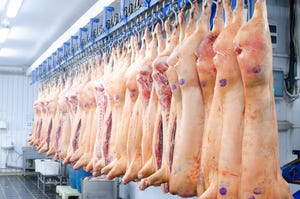JEV Information Sharing Network website launching soon
Efforts began after learning lessons from the Australian experience with Japanese Encephalitis Virus impacting pigs and people beginning in March of 2022.
March 21, 2023

In October 2022, the Swine Health Information Center joined with the Center for the Ecology of Infectious Diseases, University of Georgia to host a symposium entitled Japanese Encephalitis Virus: Emerging Global Threat to Humans & Livestock. One of the initiatives that came from the symposium was an agreement between SHIC and CEID for the latter to build and launch a JEV Information Sharing Network website. The objective is to have a JEV information resource that can answer the pork industry's immediate questions and needs if JEV is introduced into the United States. SHIC will announce the launch of the website when complete, expected within a few weeks.
This information-sharing website will be a CEID-maintained repository of pertinent JEV information available to anyone interested in JEV infectious disease dynamics. This document explains the summary for the website, examples of content and next steps. Topic areas proposed for the website include information on JEV ecology, epidemiology, economic impacts, outbreak response plans, data and technical literature.
JEV preparedness activities in the United States include assessing the risk of JEV entry and establishment, research priorities supporting identification, surveillance and response, and facilitating further information sharing through this ongoing CEID project. These efforts began after learning lessons from the Australian experience with JEV impacting pigs and people beginning in March of 2022.
In addition to the symposium conducted with CEID, SHIC has funded an updated, comprehensive entry and establishment risk assessment. Also, a complete literature review is being done to ensure the latest information on JEV genotype IV, the genotype causing the Australian outbreak, is available to help develop surveillance strategies, diagnostic assays and research.
A JEV research priority list based on identified knowledge gaps, including discussions during the symposium, has been drafted. Australian retrospective testing shows JEV was circulating in the country's swine herds for up to a year before the clinical outbreak. The wide range of impact on Australian farms – from mild to severe clinical outcomes and short to prolonged clinical disease – means work needs to be done to understand JEV's epidemiology and how on-farm and/or regional factors influence disease transmission and progression.
Additional areas identified for investigation or confirmation include oral fluids and barn effluent surveillance, and confirming PCR testing would detect all JEV genotypes, including the genotype IV responsible for the recent Australian outbreak. Further understanding pork industry economic impacts of a U.S. JEV incursion, as well as identifying competent avian and vector hosts for JEV, will be important.
Since JEV is a mosquito disease, investigating effective mosquito control measures on swine farms is also included. As part of this process, SHIC remains in communication with Australian and U.S. veterinarians and researchers to discuss opportunities for JEV collaboration.
You May Also Like



